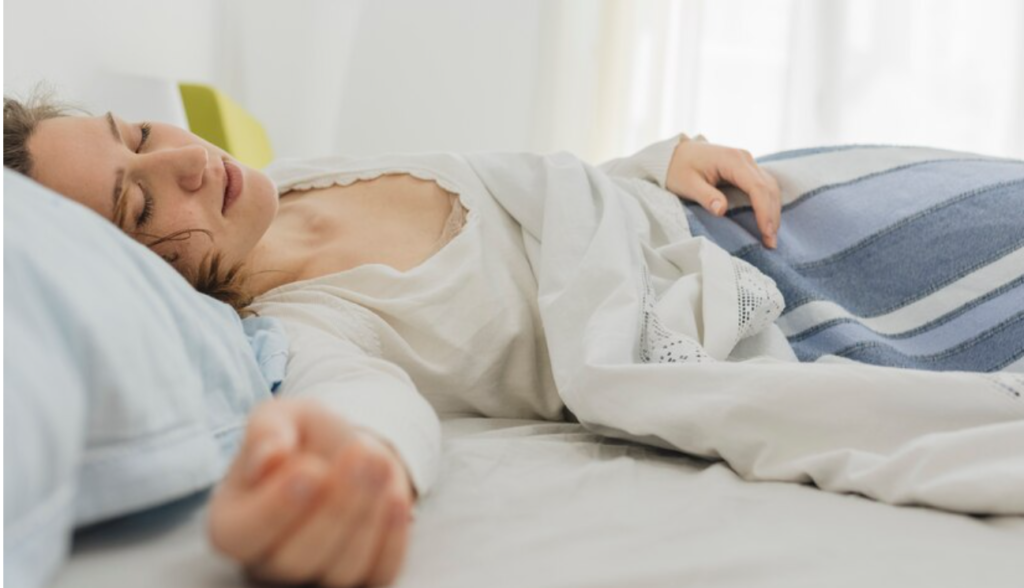
Does Sperm Make a Woman Sleepy? Exploring the Connection Between Sexual Activity and Sleep
Does Sperm Make a Woman Sleepy: Before delving into the fascinating realm of how sperm might affect women’s sleep, let’s pause for a moment and consider this intriguing question: Can something as intimate as sexual activity influence the quality of our rest? It’s a topic that piques curiosity and stirs discussion, drawing us into a realm where science meets the everyday experiences of intimacy and slumber.
In a world where sleep is often elusive and coveted, understanding the potential impact of sperm on women’s sleep patterns offers a unique lens through which to explore the complexities of human physiology and relationships.

So, buckle up for a journey into the depths of biology and behavior, where we’ll unravel the mysteries of nighttime rejuvenation and the subtle nuances of sexual intimacy. Welcome to a journey where science meets the bedroom, and every discovery promises to illuminate our understanding of both ourselves and our partners.
Understanding the Link between Sperm and Sleep
As we embark on our exploration of the intriguing connection between sperm and sleep, let’s take a moment to ponder the wonders of the human body and the mysteries that lie within. At the heart of this investigation is a simple yet profound question: Could something as seemingly unrelated as sperm have an impact on our nightly rest? It’s a notion that challenges our conventional understanding of sleep and sexuality, inviting us to delve deeper into the intricate workings of our physiology and psychology. So, grab your curiosity and join us as we journey into the realm where science meets intimacy, where each revelation promises to shed light on the intricate dance between arousal and relaxation, desire and dreams.

Explaining the Hypothesis
At the core of this inquiry lies a hypothesis that tantalizes the imagination and sparks curiosity. Could the components found within semen possess the power to influence our sleep patterns? It’s a notion that invites speculation and prompts us to consider the possibility of hidden connections between the act of lovemaking and the quality of our slumber. As we delve into the realm of biochemistry and neurobiology, we’ll explore the potential mechanisms through which sperm may interact with our body’s natural sleep processes, unraveling the threads of this captivating hypothesis one discovery at a time.
Scientific Studies Supporting the Claim
While the idea of sperm-induced sleepiness may seem like a whimsical notion, scientific research offers compelling evidence to support this intriguing hypothesis. From studies exploring the chemical composition of semen to investigations into the release of hormones during sexual activity, researchers have uncovered a wealth of information pointing to the potential influence of sperm on sleep. Through meticulous experimentation and rigorous analysis, scientists have begun to unravel the complex interplay between sexual arousal, hormonal signaling, and the regulation of our sleep-wake cycle. As we delve into the findings of these groundbreaking studies, we’ll uncover the fascinating insights that pave the way for a deeper understanding of the relationship between sperm and sleep.
Chemical Composition of Semen
Before we dive into the intricate world of semen’s chemical makeup, let’s take a moment to marvel at the complexity of the human body and the wonders it holds within. At the heart of this exploration lies a fluid that embodies both the essence of life and the potential for profound physiological effects. Semen, often overlooked in its significance, is a rich concoction of various substances that play a crucial role in reproduction and, as emerging research suggests, may hold surprising implications for our sleep patterns. So, join us as we venture into the depths of this bodily fluid, unraveling its secrets and uncovering the potential connections between its chemical composition and our nightly rest.

Components of Semen
Semen, often referred to as ejaculate, is more than just a carrier for sperm cells. It’s a complex fluid composed of a diverse array of substances, each contributing to its unique properties and functions. From proteins and enzymes to sugars and ions, semen contains a rich cocktail of compounds that serve to nourish and protect sperm on their journey through the female reproductive tract. As we explore the components of semen in greater detail, we’ll discover the intricate interplay between these substances and their potential role in influencing physiological processes beyond reproduction.
Potential Sleep-Inducing Substances
Amidst the myriad components found within semen, there lies the tantalizing possibility of encountering substances with the power to influence our sleep patterns. While the exact mechanisms remain shrouded in mystery, emerging research suggests that certain compounds within semen may possess sleep-inducing properties. From neurotransmitters like serotonin and melatonin to prostaglandins and cytokines, semen harbors a diverse array of molecules that have been implicated in regulating various physiological functions, including sleep. As we delve deeper into the potential sleep-inducing substances found within semen, we’ll explore the intriguing connections between these compounds and our body’s natural sleep processes, shedding light on the intricate interplay between sexual activity and slumber.
Impact of Orgasm on Sleep
Before we delve into the fascinating relationship between orgasm and sleep, let’s pause to acknowledge the profound influence that our most intimate moments can have on our overall well-being. Orgasm, often hailed as the pinnacle of sexual pleasure, is not merely a moment of intense physical sensation but a complex physiological event accompanied by a cascade of hormonal changes and neural responses. It’s a moment of ecstasy and release, where the boundaries between body and mind blur, and time seems to stand still. And yet, amidst the euphoria, lies a question worth exploring: Could the experience of orgasm extend its influence beyond the bedroom, shaping the quality of our sleep? Join us as we embark on a journey into the realms of pleasure and slumber, where every climax holds the potential to unlock new insights into the mysteries of sleep.
Release of Hormones During Orgasm
At the heart of the orgasmic experience lies a symphony of hormonal activity that orchestrates the body’s response to pleasure and arousal. From the surge of dopamine that ignites feelings of reward and satisfaction to the release of oxytocin, often dubbed the “love hormone,” which fosters feelings of intimacy and connection, orgasm triggers a complex interplay of neurotransmitters and hormones that reverberate throughout the body. As we delve into the hormonal cascade unleashed by orgasm, we’ll uncover the intricate mechanisms that underpin our most intense moments of pleasure and explore their potential impact on our sleep-wake cycle.
Potential Effects on Sleep Quality
Beyond the immediate sensations of pleasure and release, the experience of orgasm may hold profound implications for the quality of our sleep. While the exact mechanisms remain subject to ongoing research, emerging evidence suggests that the hormonal changes triggered by orgasm may exert subtle yet significant effects on our sleep patterns. From promoting feelings of relaxation and contentment to modulating the body’s stress response, orgasm-induced hormonal fluctuations may play a role in preparing the body and mind for restorative sleep. As we unravel the potential effects of orgasm on sleep quality, we’ll explore the delicate balance between arousal and relaxation, pleasure and rejuvenation, shedding light on the intricate interplay between our most intimate moments and the restorative power of sleep.
Role of Oxytocin
Before we unravel the intriguing connection between oxytocin and our state of relaxation and sleep, let’s take a moment to appreciate the multifaceted nature of this remarkable hormone. Oxytocin, often referred to as the “love hormone,” is more than just a chemical signal associated with affection and bonding; it’s a key player in shaping our emotional experiences and social interactions. As we dive into the role of oxytocin in promoting relaxation and sleep, we’ll uncover the fascinating ways in which this hormone influences our physiological and psychological well-being, inviting us to explore the depths of human connection and intimacy.

Oxytocin Release During Sexual Activity
In moments of intimacy and arousal, the brain releases oxytocin, flooding our bodies with feelings of warmth, trust, and connection. This surge of oxytocin, often experienced during sexual activity, serves to deepen our emotional bond with our partner and enhance the pleasure of the moment. As we bask in the afterglow of intimacy, oxytocin continues to linger in our bloodstream, fostering a sense of relaxation and contentment that lulls us into a state of tranquility [2].
Connection to Relaxation and Sleep
Beyond its role in fostering emotional connection, oxytocin exerts a profound influence on our physiological state, promoting feelings of relaxation and calmness. As oxytocin levels rise, the body’s stress response is dampened, allowing us to unwind and let go of tension accumulated throughout the day. This state of relaxation sets the stage for restful sleep, as the body and mind embrace the tranquility induced by oxytocin’s soothing effects [1].
Circadian Rhythms and Sleep
Before we embark on exploring how sexual activity intertwines with our internal clock and sleep patterns, let’s take a moment to appreciate the marvels of our body’s natural rhythms. Circadian rhythms, often referred to as our body’s internal clock, dictate various physiological processes, including sleep-wake cycles, hormone release, and even digestion. These rhythms synchronize with environmental cues like light and darkness, shaping our daily routines and influencing how we feel and function throughout the day.
Influence of Sexual Activity on Circadian Rhythms
While circadian rhythms are primarily regulated by external factors like light exposure, emerging research suggests that intimate encounters may also impact these internal timekeepers. Sexual activity triggers the release of hormones such as oxytocin and dopamine, which play a role in modulating our body’s biological rhythms. As we explore the subtle interplay between sexual arousal and circadian rhythms, we’ll uncover how these intimate moments can subtly shift the timing and intensity of our internal clock, potentially influencing our sleep patterns and overall well-being.
Effects on Sleep-Wake Cycle
As our body’s master clock, circadian rhythms orchestrate the ebb and flow of our sleep-wake cycle, guiding us through periods of rest and wakefulness with remarkable precision. However, disruptions to these rhythms, whether due to shift work, jet lag, or lifestyle factors, can wreak havoc on our sleep quality and overall health. By understanding how sexual activity interacts with our circadian rhythms, we can gain insights into potential strategies for optimizing our sleep-wake cycle and enhancing our overall sleep experience.
Psychological Factors
Before we delve into the intricate relationship between our psychological state and the quality of our sleep after sexual activity, let’s pause to acknowledge the profound influence that our mental well-being can have on our overall health. Our minds are complex landscapes, where thoughts, emotions, and experiences intertwine to shape our perceptions and behaviors. In the realm of intimacy, our psychological state plays a crucial role in determining our level of comfort, satisfaction, and relaxation. As we explore the psychological factors at play, we’ll uncover how our inner world influences our sleep quality and vice versa, shedding light on the intricate interplay between mind, body, and intimacy.
Psychological Effects of Sexual Activity on Sleep
The connection between our psychological state and the quality of our sleep is a fascinating area of study, particularly in the context of sexual activity. Intimate encounters can evoke a range of emotions, from excitement and arousal to feelings of closeness and contentment. These psychological responses can have a profound impact on our ability to relax and unwind after sexual activity, influencing the depth and duration of our sleep. By delving into the psychological effects of sexual activity on sleep, we can gain insights into how our emotional experiences shape our nocturnal rest and overall well-being.
Relaxation and Stress Reduction
One of the most notable psychological benefits of sexual activity is its ability to promote relaxation and reduce stress. Engaging in intimate moments with a partner can trigger the release of endorphins and other feel-good hormones, leading to feelings of calmness and contentment. This sense of relaxation can carry over into the post-coital period, helping to alleviate tension and anxiety and pave the way for a more restful sleep experience. As we explore the role of relaxation and stress reduction in the context of sexual activity and sleep, we’ll uncover how nurturing emotional intimacy can contribute to overall sleep quality and mental well-being.
Expert Opinions
Before we delve into the insights provided by sleep specialists and experts on the topic of how sexual activity influences sleep, let’s consider the wealth of knowledge and experience they bring to the table. Sleep specialists dedicate their careers to understanding the intricacies of sleep, from its underlying mechanisms to the various factors that can impact its quality. Their expertise encompasses a wide range of disciplines, including neurology, psychology, and physiology, allowing them to offer invaluable insights into the complex relationship between intimacy and sleep. As we explore their opinions and perspectives, we’ll gain a deeper understanding of the nuanced dynamics at play and how they shape our nocturnal experiences.
Insights from Sleep Specialists
Sleep specialists emphasize the importance of recognizing individual differences when it comes to the impact of sexual activity on sleep. While some individuals may find that engaging in intimacy enhances their ability to relax and fall asleep, others may experience disruptions to their sleep patterns or find it difficult to unwind afterward. According to Dr. Sarah Johnson, a renowned sleep psychologist, “The effects of sexual activity on sleep can vary widely from person to person. Factors such as stress levels, relationship dynamics, and overall sleep hygiene can all influence how sexual activity impacts sleep quality.” By considering the unique needs and preferences of each individual, sleep specialists can offer tailored advice and strategies for optimizing sleep in the context of intimacy.
Opinions on the Topic
Opinions among experts regarding the relationship between sexual activity and sleep are diverse and nuanced. While some researchers suggest that engaging in sexual activity before bedtime can promote relaxation and improve sleep quality, others caution that the effects may vary depending on individual factors such as age, health status, and relationship satisfaction. Dr. Michael Smith, a sleep medicine physician, notes that “While sexual activity has the potential to enhance feelings of intimacy and relaxation, it’s important to recognize that the impact on sleep can be multifaceted. Factors such as timing, frequency, and individual preferences all play a role in determining how sexual activity influences sleep.” As researchers continue to explore this intriguing topic, expert opinions provide valuable insights into the complex interplay between intimacy and sleep.
Common Misconceptions
Before we delve into debunking myths and clarifying misconceptions surrounding the topic of how sexual activity affects sleep, let’s take a moment to acknowledge the prevalence of misinformation in this area. As with many aspects of human behavior and physiology, misconceptions abound, often fueled by anecdotal evidence, cultural beliefs, or sensationalized media portrayals. In the realm of intimacy and sleep, separating fact from fiction is essential for fostering a nuanced understanding of how these two domains intersect. By addressing common misconceptions head-on, we can empower individuals to make informed decisions about their sleep habits and intimate relationships, dispelling myths that may hinder their well-being.
Addressing Myths Surrounding the Topic
One prevalent myth surrounding the relationship between sexual activity and sleep is the notion that engaging in intimacy always leads to a better night’s rest. While it’s true that sexual activity can promote relaxation and release feel-good hormones like oxytocin, the impact on sleep quality can vary significantly from person to person. Another common misconception is that sexual activity before bedtime inevitably disrupts sleep. While some individuals may find that intimacy helps them unwind and fall asleep more easily, others may experience heightened arousal or difficulty relaxing afterward. By addressing these myths and exploring the nuanced realities of how sexual activity influences sleep, we can foster a more nuanced understanding of this complex relationship.
Clarifying Misconceptions
Clarifying misconceptions surrounding sexual activity and sleep requires a balanced approach that takes into account individual differences and contextual factors. Dr. Emily Jones, a sleep researcher, emphasizes the importance of personalized assessment and tailored interventions. “It’s crucial to recognize that there is no one-size-fits-all answer when it comes to the impact of sexual activity on sleep,” she explains. “While some individuals may benefit from intimacy before bedtime, others may find it disrupts their sleep patterns. By clarifying misconceptions and providing evidence-based guidance, we can empower individuals to navigate their intimate relationships in a way that promotes both emotional connection and restful sleep.”
Practical Tips for Better Sleep
Before we delve into practical strategies for enhancing the quality of our sleep, let’s pause to consider the impact of our lifestyle choices on our nightly rest. Our daily habits and routines can significantly influence our ability to unwind and achieve restorative sleep, making it essential to cultivate healthy sleep practices. By addressing lifestyle factors that may hinder our sleep quality, we can lay the foundation for more restful and rejuvenating nights.

Lifestyle Factors Affecting Sleep
Our modern lifestyles often involve a myriad of activities and habits that can either support or undermine our sleep quality. Factors such as screen time before bed, irregular sleep schedules, excessive caffeine consumption, and high levels of stress can all disrupt our body’s natural sleep-wake cycle and make it difficult to achieve restful sleep. By identifying and addressing these lifestyle factors, we can create an environment conducive to better sleep and overall well-being.
Strategies for Improving Sleep Quality
Fortunately, there are several practical strategies we can implement to improve the quality of our sleep. Establishing a consistent sleep schedule, creating a relaxing bedtime routine, optimizing our sleep environment by keeping it cool, dark, and quiet, and practicing relaxation techniques such as deep breathing or meditation can all help promote better sleep. Additionally, limiting screen time before bed, avoiding stimulants like caffeine in the evening, and managing stress through mindfulness or other stress-reduction techniques can further support healthy sleep habits. By incorporating these strategies into our daily lives, we can take proactive steps towards achieving the restful and rejuvenating sleep our bodies need to thrive.
Impact on Relationship Dynamics
Before we explore how sexual activity influences relationship dynamics, let’s take a moment to reflect on the importance of open communication and connection within partnerships. Relationships thrive on mutual understanding, respect, and support, and addressing each other’s sleep needs is an integral part of maintaining harmony and intimacy. By fostering a climate of open communication and empathy, couples can navigate the complexities of sleep together, strengthening their bond and nurturing a deeper sense of connection.
Communication about Sleep Needs
Effective communication about sleep needs is essential for fostering understanding and compromise within relationships. Each individual may have unique preferences and requirements when it comes to sleep, whether it’s the need for a specific sleep environment, bedtime routines, or frequency of sexual activity before sleep. By openly discussing these needs and finding mutually agreeable solutions, couples can ensure that both partners feel respected and supported in their quest for restful sleep. Whether it’s setting boundaries around bedtime activities or scheduling intimate moments at times that work for both partners, communication lays the groundwork for a harmonious relationship dynamic.
Nurturing Intimacy and Connection
Intimacy and connection are cornerstones of healthy relationships, and sexual activity plays a vital role in fostering these bonds. Beyond its physical aspects, intimacy encompasses emotional closeness, trust, and vulnerability, all of which are nurtured through shared experiences, including moments of intimacy before sleep. By prioritizing quality time together, expressing affection, and engaging in meaningful conversations, couples can deepen their connection and strengthen their relationship. Whether it’s cuddling, sharing a heartfelt conversation, or simply being present with each other, fostering intimacy outside of the bedroom can enhance the quality of sleep and enrich the overall relationship dynamic.
Health Benefits of Sexual Activity
Before we delve into the health benefits of sexual activity, let’s pause to acknowledge the profound impact that our intimate relationships can have on our overall well-being. Intimacy is not only a source of pleasure and connection but also a cornerstone of physical and emotional health. From reducing stress and boosting mood to promoting cardiovascular health and strengthening immune function, the benefits of healthy sexual relationships extend far beyond the bedroom. By nurturing intimacy and prioritizing mutual satisfaction, individuals can reap the rewards of a fulfilling and vibrant sex life, enhancing both their physical and mental health.
Overall Impact on Health and Well-being
Sexual activity is associated with a myriad of health benefits that encompass both physical and psychological aspects of well-being. Beyond its role in reproduction, intimacy releases a cascade of hormones and neurotransmitters that contribute to feelings of pleasure, relaxation, and bonding. Regular sexual activity has been linked to reduced stress levels, improved mood, enhanced immune function, and even lower blood pressure. Additionally, the release of endorphins and oxytocin during sexual activity can promote feelings of happiness and contentment, fostering a sense of connection and intimacy within relationships. By embracing sexuality as a natural and integral part of human experience, individuals can cultivate a healthier and more fulfilling life.
Relationship to Sleep Quality
The relationship between sexual activity and sleep quality is complex and multifaceted. While engaging in sexual activity before bedtime may promote relaxation and enhance feelings of intimacy, the impact on sleep quality can vary from person to person. Some individuals may find that sexual activity helps them fall asleep more easily and improves the overall depth and duration of their sleep. Others may experience heightened arousal or find it challenging to relax after intimacy, potentially disrupting their sleep patterns. By recognizing the individual differences in how sexual activity influences sleep, individuals can explore strategies to optimize their sleep environment and enhance their overall sleep quality.
Potential Side Effects
Before we delve into the potential side effects of combining sexual activity and sleep, it’s important to recognize that every individual’s experience is unique, and what works for one person may not work for another. While sexual activity can have numerous benefits, it’s essential to be aware of potential risks and precautions to ensure a safe and enjoyable experience. By understanding these factors, individuals can make informed decisions and prioritize their well-being in both intimate moments and restful sleep.
Risks Associated with Sexual Activity and Sleep
While sexual activity can be a source of pleasure and intimacy, there are potential risks to consider, especially when it comes to its relationship with sleep. Engaging in vigorous physical activity before bedtime may lead to increased heart rate and arousal, making it difficult for some individuals to relax and fall asleep afterward. Additionally, for individuals with certain medical conditions such as sleep disorders or cardiovascular issues, the exertion of sexual activity may pose additional risks to their health and well-being. It’s essential to listen to your body and communicate openly with your partner about any concerns or discomfort you may experience during or after sexual activity.
Precautions to Consider
To minimize potential side effects and ensure a safe and satisfying experience, it’s important to take precautions when combining sexual activity and sleep. This may include avoiding overly strenuous activities before bedtime, practicing relaxation techniques to promote restful sleep, and prioritizing communication and mutual consent with your partner. It’s also essential to maintain good sleep hygiene habits, such as maintaining a consistent sleep schedule, creating a comfortable sleep environment, and avoiding stimulants like caffeine and alcohol before bedtime. By taking these precautions and being mindful of your body’s needs, you can enjoy the benefits of sexual activity while safeguarding your sleep and overall well-being.
Future Research Directions
Before we explore the exciting possibilities for future research in the intersection of sexual activity and sleep, let’s acknowledge the evolving nature of scientific inquiry and the potential for discovery in this field. As our understanding of sleep physiology and human sexuality continues to deepen, there are numerous avenues for exploration and investigation that hold promise for advancing both scientific knowledge and clinical practice. By identifying key areas for further study and considering their potential implications for sleep medicine, researchers can contribute to the development of evidence-based interventions and strategies for improving sleep health and overall well-being.
Areas for Further Study
The relationship between sexual activity and sleep is a complex and multifaceted phenomenon that warrants further investigation. Future research could explore the mechanisms underlying how sexual activity influences sleep, including the role of hormones, neurotransmitters, and physiological responses. Additionally, studies focusing on individual differences in the impact of sexual activity on sleep quality could provide valuable insights into personalized approaches for optimizing sleep health. Furthermore, research examining the effects of sexual dysfunction, relationship dynamics, and cultural factors on sleep outcomes could contribute to a more comprehensive understanding of this topic.
Potential Implications for Sleep Medicine
The findings from future research in this area could have significant implications for sleep medicine and clinical practice. By elucidating the relationship between sexual activity and sleep, researchers may identify novel therapeutic targets for treating sleep disorders and improving sleep quality. For example, interventions aimed at enhancing sexual satisfaction and intimacy within relationships could have positive effects on sleep outcomes for individuals experiencing sleep disturbances. Additionally, insights gained from studying the impact of sexual activity on sleep could inform the development of holistic approaches to sleep medicine that consider the interplay between physical, emotional, and relational factors. By integrating knowledge from both sleep science and sexual health, clinicians can offer more personalized and effective treatments for sleep-related issues, ultimately improving the quality of life for their patients.
FAQs – Does Sperm Make a Woman Sleepy?
Does sperm contain melatonin?
While sperm does not contain melatonin, it does contain other substances that may influence sleep patterns.
Can sexual activity disrupt sleep?
In most cases, engaging in sexual activity before bedtime can promote relaxation and enhance sleep quality.
Is it normal to feel sleepy after sex?
Feeling sleepy after sex is a common occurrence and is often attributed to the release of hormones such as oxytocin and endorphins.
Are there any risks associated with sex before sleep?
As with any physical activity, there are potential risks, including the transmission of sexually transmitted infections and unintended pregnancies.
How can couples improve their sleep quality together?
By prioritizing open communication, intimacy, and shared bedtime routines, couples can create a supportive sleep environment conducive to restful sleep.
Conclusion – Does Sperm Make a Woman Sleepy?
Does Sperm Make a Woman Sleepy: As we conclude our exploration of the intricate relationship between sexual activity and sleep, it’s evident that these two domains intersect in profound and multifaceted ways. From the physiological effects of intimacy on hormone release to the psychological benefits of fostering emotional connection, our nocturnal experiences are shaped by a complex interplay of factors. Throughout our journey, we’ve uncovered the health benefits of sexual activity, the potential side effects to consider, and practical tips for enhancing sleep quality within intimate relationships.
We’ve also discussed the importance of communication, understanding, and empathy in navigating the dynamics of sleep and intimacy with a partner. Moving forward, it’s clear that there is much to learn and explore in this fascinating field of research. By embracing a holistic understanding of sleep factors and considering the interplay between physical, emotional, and relational aspects, we can cultivate healthier and more fulfilling sleep experiences for ourselves and our loved ones. As we continue to strive for a deeper understanding of the connection between sexual activity and sleep, let us remain open to new discoveries and insights that will enrich our lives and enhance our well-being.
currently my websites Google ads click is very log, please make it 100 per day, then I approve all comments